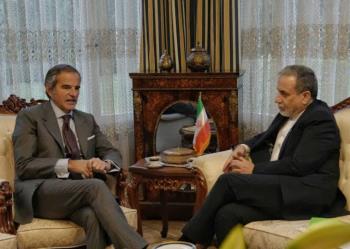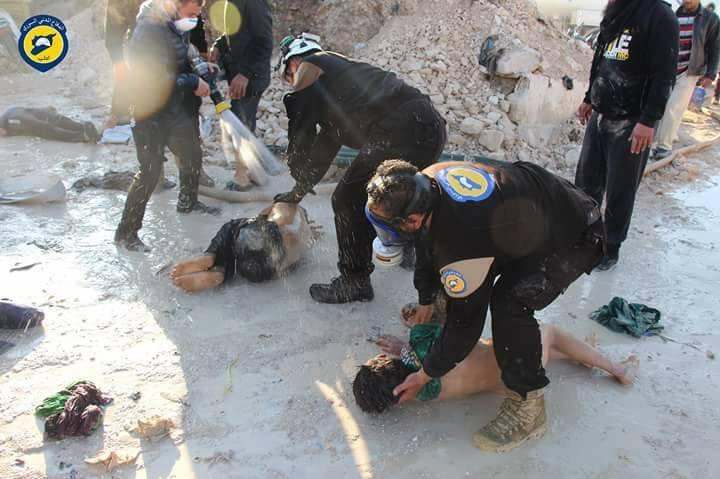Nothing prompts abdication of journalistic responsibility on American TV more swiftly than “beautiful” images of bombs crashing down on Syria.
It must be assumed that while busy fawning over Donald Trump’s various military escapades, journalists simply haven’t had the time to give dissenting voices an opportunity to be heard.
Because when it comes to airing opinions on Trump’s bombing of a Syrian airbase two weeks ago, in response to an alleged chemical attack on Khan Sheikhoun, it seems that only experts who agree with the White House may apply.
This is a highly ironic turn of events because before Trump learned the dangerous lesson that bombing was the key to unlocking his popularity among both liberals and conservatives, the media was jumping at any opportunity to make him look like a buffoon who should be impeached and thrown out of office.
Media blackout
Let’s take a look at some of the voices you won’t have heard on US news channels in the aftermath of the chemical incident and Trump’s subsequent attack on the Shayrat airbase:
1. Theodore Postol, chemical weapons expert and professor emeritus, Massachusetts Institute of Technology (MIT)
Postol has authored a detailed 14-page report which calls into question claims made in the Trump administration’s declassified 4-page report which was used as ‘evidence’ that Bashar Assad was behind the chemical incident on April 4.
The US report “contains absolutely no evidence that this attack was the result of a munition being dropped from an aircraft. In fact, the report contains absolutely no evidence that would indicate who was the perpetrator of this atrocity,” Postol wrote. What’s more, Postol’s own analysis of the incident in Idlib “indicates that the munition was almost certainly placed on the ground with an external detonating explosive on top of it.”
Postol went so far as to tell The Nation he believes the White House “fabricated” its evidence and “certainly did not follow the procedures it claimed to employ” in reaching the conclusion that Assad was responsible for dropping chemical weapons in Khan Sheikhoun. In his opinion, that 4-page report was a “clumsy” attempt to cover up the fact that Trump attacked Assad’s air base with no real evidence.
He told The Nation that White House staff may be worried about this leaking and the bad optics of “a reckless president acting without regard to the nation’s security, risking an inadvertent escalation and confrontation with Russia.”
Postol was cited by the New York Times in 2013 as a “leading weapons expert,” but the newspaper has ignored his 2017 report entirely.
2. Jerry Smith led the UN-backed operation to remove Syria's chemical weapons in 2013
Smith has appeared in UK media urging caution over the rush to judgment on the latest chemical incident. “We need to be very conscious of all playbooks that are being put out there at the moment. I think it’s very premature if we start dismissing one accusation or another,” he told Channel 4’s, Jon Snow.
When Snow asked if it was plausible that Syrian rebel groups had been storing chemical weapons, Smith said it was “not beyond the realms of possibility” particularly for some of the most extreme rebel groups.
Smith also poured cold water on suggestions made by others that sarin gas would have been entirely consumed and destroyed (making it impossible to spread) in the case of a conventional bomb being dropped on a chemical stockpile.
If that was the case, he said, “there is every possibility that those munitions were not consumed and that in fact the sarin liquid was ejected and could well have affected the outstanding population.”
3. Peter Ford, former British ambassador to Syria
Ford has appeared on the BBC calling for a proper investigation into the chemical incident, and, like Smith, has urged that the media not jump to conclusions without sufficient evidence.
“There are two possibilities for what happened. One is the American version that Assad dropped chemical weapons on this locality. The other version is that an ordinary bomb was dropped and it hit a munitions dump, that jihadis were storing chemical weapons. We don’t know which of these two possibilities is the correct one,” he said.
Ford also recalled the lead-up to the invasion of Iraq. At that time, he said “the experts, the intelligence agencies, the politicians were convinced that Saddam had weapons of mass destruction. They produced reams of evidence; photographs, diagrams. It was all wrong — and it’s possible that they’re wrong in this instance, as well”.
Later in the interview, when asked pointedly by the BBC interviewer, why he was a “relatively lone voice” straying from the mainstream narrative, Ford said: “We cannot take at face value what the so-called intelligence experts tell us, not when they have an agenda.”
Ford also took aim at the “gullible media” and argued that Trump has given jihadis “a thousand reasons” to now stage false flag attacks with chemical weapons in order to prompt more US military action.
Questioning the widely held assumption that Assad would use chemical weapons at this point in the war, Ford said Assad “may be cruel and brutal, but he’s not mad. It defies belief that he would bring this all on his head for no military advantage.”
4. Philip Giraldi, former CIA officer
Giraldi is another skeptical voice who has been almost entirely ignored by US media. The former CIA officer claims his sources in the region are telling him the narrative the Trump administration used to sell his decision to bomb the Syrian air base is “a sham.”
He said his contacts were shocked at how the story was being spun by the Trump administration and media.
In a radio interview with Scott Horton, he said: “The intelligence confirms pretty much the account that the Russians have been giving...which is that they [Syrian forces] hit a warehouse where the rebels – now these are rebels that are, of course, connected with Al-Qaeda – where the rebels were storing chemicals of their own, and it basically caused an explosion that resulted in the casualties. Apparently, the intelligence on this is very clear.”
Selling war
It’s abundantly clear based on the above comments and expert analysis that responsibility for the deaths at Khan Sheikhoun has not been determined. Despite this, media reports continue to state as fact that blame lies with Assad.
The US media has opted, unquestioningly, to trust unverified information that has come from the same intelligence agencies that led them into the war in Iraq based on lies. They have chosen to swallow, hook, line and sinker, information supplied by Al-Qaeda-linked rebel factions who possess the clear motivation to lie in an effort to prompt the kind of shock and awe Western military intervention they’ve been after for years.
What’s really amazing, though, is that journalists continue to follow this narrative despite evidence anti-Assad rebels have already been implicated — by a UN report — in staging a false chemical attack to pin the blame on the Assad government.
But none of that matters when you’ve got a war to sell. So, in their rush to support new military action, the American mainstream media opts to give voice only to those who will echo their own narrative.
One man, they have been keen to listen to is Dr. Shajul Islam. In 2012, Islam was arrested in the UK and charged with kidnapping journalists in Syria. The case against him fell apart, and the charges dropped because the witnesses were unable to testify. John Cantlie, one of the journalists, is still in captivity.
Islam is now back in Idlib, an Al-Qaeda stronghold in Syria, and is a go-to source on the Khan Sheikhoun incident for Western media. To make this all the more strange, the media has also ignored reports that Islam’s brother Razul is believed to have entered Syria to fight as a volunteer for ISIS.
None of this is to say that Postol, Smith, Ford, Giraldi and others are necessarily correct in their assessments either. Nor is the point to ‘absolve’ Assad of all blame for civilian deaths in Syria — a common insult lobbed at anyone who questions the mainstream narratives of this war.
The simple truth is that the facts have not been fully determined. US journalists, in an effort to promote their own version of events, have completely relinquished their responsibility to offer the full spectrum of analysis and expert opinion needed for viewers to make informed judgments on their country’s latest military action.
Source: Russia Today



























